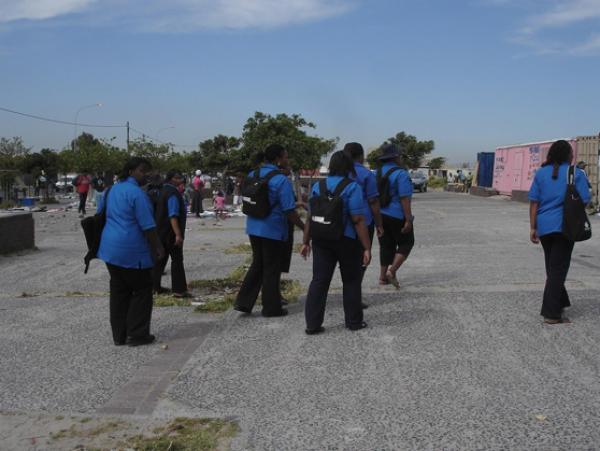“I love what I do, but there are many problems as well.” - a community health worker’s story

A Delft South community health worker (CHW) had no choice, but to take two weeks unpaid leave after sustaining a serious back injury while bathing a patient earlier this year.
“I had to stay at home without any pay for two weeks. My monthly stipend of R1,845 has to cover food and school fees for my children. I came short and couldn’t even pay my bills,” she said.
The CHW has asked not to be named because she fears for her job security. She is a mother of five and has been working as a CHW for the last twelve years.
“I love what I do, but there are many problems as well. We usually work with partners that make lifting and bathing the patients easier. We do full washes for our patients three times a week. That day, my partner went for training and I did everything by myself. I couldn’t move for two weeks, so I just had to accept that,” she said.
She is among thousands of community health care workers country-wide who are waiting for the release of the national draft policy.
Advocacy groups that have been instrumental in highlighting the plight of these workers believe the policy will address key concerns relating to the conditions of services like wages and employment contracts.
The draft Community Care Worker Policy Framework policy is currently still with the department.
The Western Cape Department of Health provides more than R250 million in funding to non-profit organisations of which R100 million is allocated specifically for the Home Community Based Care services.
Community health care workers are employed and paid by the organisations. Since November 2011, the CHW and several of her colleagues have been attending weekly meetings with the labour support organisation, the Industrial Health Resources Group.
During the meetings, workers are given a platform to voice concerns and discuss the challenges they experience while working in the Delft South community.
“When the patient has no food in the house, I take R5 or more of my own money to buy something to eat so the patient can take his or her medication. Sometimes we also don’t have equipment like masks. Patients don’t always tell you that they were diagnosed with TB,” she said.
Another CHW, who also asked not to be named, said besides being exposed to the criminal elements that come with working in the gang-ridden area, they were often subjected to verbal abuse from patients and their families.
“It’s very nice to work in the field, but it’s painful at times because of the gangsterism out there. The crime is one of our biggest fears,” she said.
In order to address the challenges, she said it was important for government to consult with the workers before implementing new policies.
The Industrial Health Resources Group’s occupational health and safety trainer, Ntombi Mfiki, said the absence of standardised policies made it difficult for workers to report problems like injuries.
“If these workers are injured on duty then there is no one to take responsibility for them. It’s very difficult for them to report these kinds of injuries and be recognised as an injury on duty because their employment contracts at this stage do not make this clear,” she said.

This article is licensed under a Creative Commons Attribution-NoDerivatives 4.0 International License.


